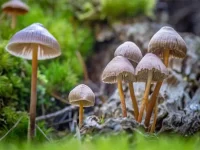Introduction: Understanding the Potential of Magic Mushrooms
In recent years, the exploration of alternative treatment solution for depression has gained traction, with researchers delving into the potential therapeutic effects of substances like magic mushrooms. A recent study published in the British Medical Journal sheds light on the promising role of psilocybin, the active compound in magic mushrooms, in alleviating depression symptoms. This article explores the findings of this study and delves into the implications of using magic mushrooms as a treatment solution for depression.
The Science Behind Magic Mushrooms
What is Psilocybin?
Psilocybin is a naturally occurring psychedelic compound found in various species of mushrooms, colloquially known as magic mushrooms. When ingested, psilocybin is metabolized into psilocin, which interacts with serotonin receptors in the brain, leading to alterations in perception, mood, and consciousness.
Mechanism of Solution for depression
Psilocybin primarily acts on the serotonin system in the brain, specifically targeting serotonin 5-HT2A receptors. By modulating serotonin levels and neurotransmission, psilocybin induces profound changes in neural activity, resulting in altered states of consciousness and perception.
Assessing the Efficacy of Psilocybin for Depression
Research Methodology
The study conducted by British researchers involved a comprehensive analysis of existing databases and trials exploring the use of psilocybin as a treatment solution for depression. Researchers examined data from trials involving 436 individuals with depression, assessing the impact of psilocybin on depressive symptoms when administered alongside psychotherapy.
Key Findings Solution for Depression
The findings of the study revealed that even a single dose of psilocybin led to a significant reduction in depression symptoms among participants. Patients reported marked improvements in mood, outlook, and overall well-being following treatment with psilocybin.
Implications and Future Directions
While the results of the study are promising, researchers emphasize the need for further investigation to fully understand the long-term effects and safety profile of psilocybin as a treatment solution for depression. Continued research in this area could pave the way for the development of novel and effective therapeutic interventions for individuals struggling with depression.
Addressing Regulatory Challenges and Public Perception
Current Regulatory Status
Despite the potential therapeutic benefits of psilocybin, magic mushrooms remain classified as a Schedule I substance in many countries, including the United Kingdom. This classification imposes significant regulatory hurdles and restricts access to psilocybin for research and clinical purposes.
Changing Perspectives
As scientific evidence supporting the therapeutic use of psilocybin continues to accumulate, there is growing momentum for reconsidering the regulatory status of magic mushrooms a promising solution for depression. Advocates argue that a more nuanced approach to drug policy is needed to facilitate research and ensure that individuals with treatment-resistant depression have access to potentially life-changing interventions.
Conclusion: A Glimmer of Hope in the Fight Against Depression
The findings of the recent study offer a glimmer of hope for individuals battling depression, highlighting the therapeutic potential of magic mushrooms as a complementary treatment option. While significant challenges lie ahead, continued research and advocacy efforts hold the promise of unlocking new pathways for addressing the global burden of depression.
FAQs (Frequently Asked Questions)
- Are magic mushrooms legal?
In many jurisdictions, including the UK, magic mushrooms are classified as illegal substances due to their psychoactive properties. However, there are ongoing discussions and efforts to reconsider their regulatory status for medical and research purposes.
- Is psilocybin safe for everyone?
Psilocybin therapy should only be administered under the supervision of trained professionals in a controlled setting. Individuals with a history of psychiatric disorders or certain medical conditions may not be suitable candidates for psilocybin treatment.
- How does psilocybin compare to traditional antidepressants?
Psilocybin operates through a different mechanism than traditional antidepressants, offering a unique approach to treating depression. While more research is needed to directly compare their efficacy and safety profiles, psilocybin shows promise as a rapid-acting antidepressant with the potential for long-lasting effects.
- What are the potential side effects of psilocybin therapy?
Common side effects of psilocybin therapy may include nausea, increased heart rate, and altered perception. Serious adverse reactions are rare but can occur, emphasizing the importance of conducting psilocybin therapy under medical supervision.
- How can individuals access psilocybin therapy?
Currently, access to psilocybin therapy is limited due to regulatory restrictions. Individuals interested in exploring this treatment option should consult with healthcare professionals and advocate for expanded access to psychedelic-assisted therapies.



